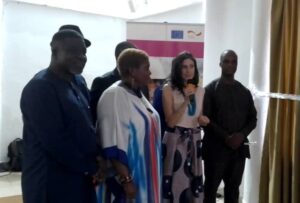[ad_1]

The British Council has launched a €1.15 million Vocational Education and Training (VET) Toolbox project to support skills development in the agriculture sector.
The two-year project is being implemented in Ghana by the British Council as part of the European Union funded VET Toolbox initiative and supported by the German Federal Ministry of Economic Cooperation and Development (BMZ).
It aims to establish and pilot a framework for developing skilled human resources within the scope of the Savannah Zone Agricultural Productivity Improvement (SAPIP) in three regions -Northern, Savannah and North East.
The VET Toolbox project is also to provide the country with targeted expertise, grant funding, tools, and advice to improve the effectiveness of national vocational education and training (VET) reforms to respond to labour market needs and enhance employability for the youth.
Mr Nii Doodo Dodoo, British Council Country Director, speaking during the launch in Tamale on Thursday, said Ghana had already benefitted from short-term technical support from the VET Toolbox in a project delivered jointly by the British Council and GIZ in collaboration with Fair River International Association for Development focussing on curriculum development, careers development and private sector engagement.
Mr Dodoo said, “This early work centres on opportunities mapping exercise to understand the investment landscape within Ghana and identify where a VET Toolbox project can deliver maximum local benefit.”
He said, “VET Toolbox project will enhance decent work and inclusive growth by providing people with the knowledge, skills, and competencies required for the jobs of today and tomorrow.”
Madam Marta Brignone, Programme Officer, Macro-economic and Trade Section of the European Union in Ghana indicated that Ghana was one of 11 Sub-Saharan countries that would benefit from the new pillar of the VET Toolbox.
She said the VET Toolbox was an international facility aiming to improve the effectiveness of VET systems by making them more opportunity-driven, turning investments into drivers for inclusive economic growth, social development, and decent job creation.
She said the project was being delivered by a consortium of leading European agencies, including British Council, Enabel (Belgium), GIZ, LuxDev (Luxembourg), AFD (France) and Expertise France.
She said, so far, the project interventions had supported change at systems level in each of the implementing countries.
Mr Solomon Antumwini, Director of Programmes at British Council, explained that the project focused on four thematic areas such as evidence-based VET and labour market programming, private sector involvement in VET and labour market activities to increase local benefits from European investments through VET and skills development.
Mr Abraham Sarfo, Team Leader, VET Toolbox, said critical to this work was collaboration with key local stakeholders, adding National Advisory Board of such stakeholders had already been established to ensure that their knowledge and guidance would help ensure the development of a project that was tailor-made to meet the country’s skills and jobs challenges.
Mrs Mawusi Awity, Director-General of Ghana Technical Vocational Education Training Service, advised the stakeholders involved in the implementation of the project to involve more women in the project to enhance their capabilities for commercial farming to promote food security in the country.
Hajia Hawa Musah, Northern Regional Director of Agriculture, called on the stakeholders of the project to create business opportunities and build the capacity of the young ones and networks of organisations and individuals to enhance economic growth.
Source: GNA
[ad_2]
Source link
